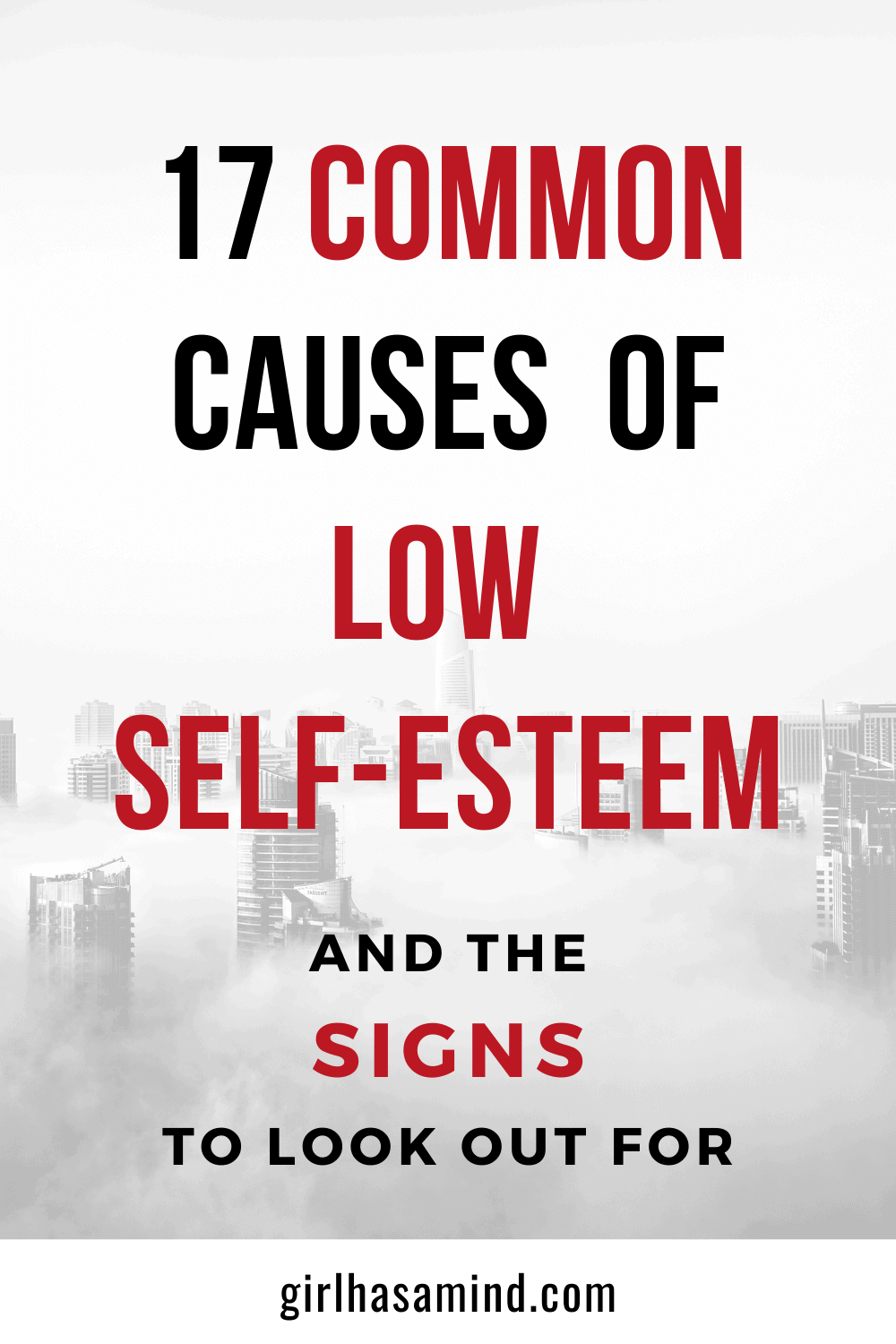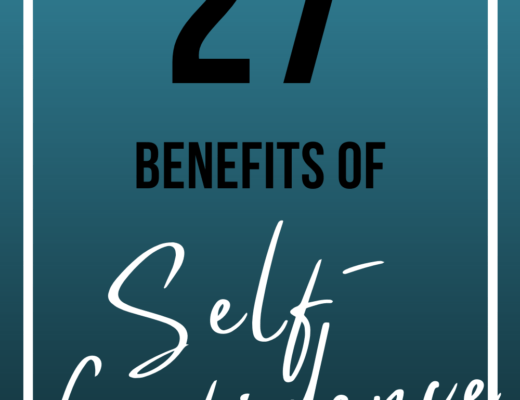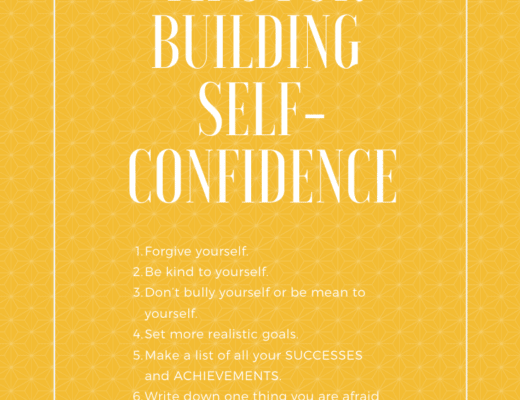17 common causes of low self-esteem and the signs and symptoms to look out for in other people.
The causes of low self-esteem are complex and each build on top of the other increasing feelings of shame, guilt, anxiety and depression.
Causes of low self-esteem
1. Parents (Or Carers)
Our parents are the first people in this world we bond with and come to depend upon.
Absent, negligent, critical or abusive parents can heavily influence our feelings of self-worth in a negative way.
Similarly, parents who are going through a contentious divorce often resort to using their children as pawns, which will cause the children not only pain and fear, but may lead them to feel like their parents don’t value them or love them simply as they are, and that their only value comes from how they can help their parents in their goals.
On the other hand, parents who are loving, caring, put the needs of their children first, are there for them and genuinely care about their well-being, are more likely to raise healthy, resilient and confident children.
Unfortunately, even well-meaning parents often try to force their children into the life they never had, by making them go to certain schools or universities, dress or talk in a certain way, participate in certain sports, etc. All of which can make a child feel that their parents do not care about them simply for who they are, but for how they increase the social standing of the parents.
Related Posts
2. Other Adults & Authority Figures
Teachers who are critical and negative, who put down students can damage the confidence and sense of self-worth of a student.
Other adults also play a role.
Children often get mixed up in situations with adults that lead to abuse, sexual or otherwise.
As adults, our bosses and other managers at a workplace also play a role in the development of our self-esteem. A critical manager that always finds fault or humiliates us in front of colleagues can really damage our self-worth.
3. Peers
Negative friends and toxic relationships have a big impact on our feelings of self-worth and self-esteem.
Friends or social groups often pressure us to do things we might find uncomfortable, like smoking. When we give in to that peer pressure we end up regretting it later. This damages not only our self-confidence but also trust in our own judgement and decisions.
If we resist the pressure from our own social group, it can lead to criticism and being ostracised from the group. This can cause us to feel that there is something wrong with us, or that the only way to be liked is to do the things other people want you to do.
Either way, we often feel that no-one is really interested in our thoughts or opinions, and this must be because we are not worthy in some way.
4. Trauma and Abuse
Abuse in all its forms (sexual, physical, emotional, etc) has an unfortunate tendency to cause the victim shame and guilt.
That victim might feel that in some way, they deserved the abuse because they are not worthy of being loved, cared for and respected.
This creates and then amplifies feelings of low self-esteem.
5. Toxic Relationships
I feel relationships deserve a section all by itself.
Family relationships, friendships, teacher-student relationships and especially romantic relationships all open us up to being vulnerable to criticism, bullying and abuse because when you form a relationship with someone, you extend that person your trust.
So when they abuse that trust with criticism or negativity, not to mention outright bullying or abuse, because you trust them, the impact on you is far greater than when it’s a random stranger, or simply someone whose opinion you don’t particularly care about.
While it’s harder to escape abusive parents, just think how many people stay in abusive romantic relationships.
Breaking free is hard, because we trust the other person, we also trust what they say and do to us, as twisted as that may sound.
Toxic relationships cause emotional and mental damage that can last for years, if not decades. They make us question our own judgement, fear our own decisions, doubt our own thoughts and make us feel very worthless in the process.
In the long run, it damages our ability to trust ourselves.
6. Bullying
Parents, teachers, peers, friends, boyfriends or girlfriends, work colleagues, or other family members or adults can also be bullies.
The words that they say can be very hurtful, and can cause pain and confusion in even the strongest and most resilient person.
Add the online world where everyone feels entitled to air their opinion without fear of punishment, and you have a perfect storm.
7. Body Image
A survey by the University of Washington of girls as young as 9-10 years old, found that 40% had tried to lose weight.
By the age of 13, 53% of American girls were unhappy with their bodies. By the time they reach the age of 17, that number grows to 78%.
In the book “I’m, Like, SO Fat!, by Dianne Neumark-Sztainer, she reports that 50% of teen girls and 30% of teen boys has practised unhealthy behaviours in order to lose weight, from skipping meals, vomiting, smoking cigarettes, fasting to using laxatives.
We live in a world where we are constantly being bombarded with images and advertising of people with beautiful bodies and perfect looking faces.
We forget that they are being paid to put that much money and energy into their appearance, so when we compare ourselves to them, we often find that we are ugly or fat in comparison.
In addition, certainly for women, the way the media or television portrays us, we are often left with the impression that our bodies are for others to enjoy, that other people have a right to express an opinion about our appearance, and that it’s our “job” to look pretty all the time.
Feeling that you only have “value” because of your appearance can lead to low self-esteem in any one, regardless of age or gender/sexual orientation.

8. Social Media
While bullying and body image certainly touched on social media, it deserves a section all by itself.
First of all, social media is extremely artificial. Everything you see is airbrushed. Everyone, not just influencers, have a tendency to only add their best selves to social media, only those images that make them appear to be living a life of luxury and beauty will get posted. We never see the ugly photos, only the beautiful ones.
Second, there is a sense of distance. People have a tendency to say or post comments or opinions that they would never say out loud in person, or certainly not directly TO someone.
Third, lack of accountability. If you did or said something nasty in real life, in your social group or society, then that group would often make it clear that that sort of behaviour is not acceptable. But on the internet, you can get away with almost anything in the right setting or social group.
This list can go on and on, so we’ll stop there.
Suffice to say, when we compare our own boring lives with the lives of others on social media, we often feel unglamorous, ugly, unsuccessful and unworthy.
When others criticize us on social media, it stings just as much as if they did it in real life.
9. Academic Performance
School is hard enough for any teenager still trying to figure out their place in the world while navigating not only their own confusing emotions but also the behaviour of adults.
Add mentally challenging activities like mathematics or science into the mix, and it can get to be too much.
Often teachers are really bad at explaining things in a way some students can grasp, which can lead the students to feel they are stupid.
10. Sport
In school, it certainly appears that some students are more naturally gifted for sports (or maths for that matter) than others.
However, some schools force students to participate in certain activities against their will, this causes them a great amount of stress and anxiety, and they feel exposed and vulnerable.
11. Fishbowl
Some situations are akin to being in a fishbowl.
High school, college and universities certainly fit this description.
For example, let’s take high school.
Students are trapped in an environment, with very little power of their own, having to abide by a schedule set by adults, living in a world where the rules are made by adults.
However, given their age and experience, they have no knowledge or exposure to that adult world everyone is preparing them for. All they know is that they are “forced” to do certain things by adults who claim to have their best interest at heart.
Or put another way, adults are in charge of all the decision making over the lives of the students.
All that they know, their entire life experience, is associated with the school and what happens when they are at school, which is most of the day.
In other words, it’s a fishbowl. Like a goldfish, students are trapped in an artificial world, they can look through the glass at what’s outside, but in reality it doesn’t make much sense and they can’t reach that outside anyway.
This makes high school feel like a rite of passage.
It can also increase your sense of powerlessness, and make you feel that adults don’t really care about your thoughts or feelings, that you are not unique, or worse, too unique (when you really wish you were like everyone else). This can lead to low self-esteem which in turn can lead to anxiety and depression .
12. Belief Systems
Religion has a tendency to make us feel we should live or dress in a certain way.
Cultural expectations do the same.
In certain cultures, women are expected to dress in a certain way and are made to feel guilty or ashamed when they don’t.
In contrast, in almost all cultures, men are still made to feel shame for crying.
Not to mention the many places in the world where homosexuality are still judged to be a sin, or disgusting.
This belief that we must behave in a certain way to fit in with the society we grew up in, can cause a lot of conflict in our hearts and minds.
We end up feeling fear of being judged, shame or guilt, and a lot of self-loathing.

13. Fixed Mindset
Coined by Dr Carol Dweck in her book “Mindset: The New Psychology of Success”, a fixed mindset is when people believe that their basic intelligence, talent or skills are fixed traits they were born with.
They spend their time documenting or proving their intelligence or talent instead of developing them.
People with a fixed mindset therefore have a tendency to avoid challenges, give up too easily when faced with obstacles, and feel threatened by the success of other people.
Like perfectionists, this makes it very difficult for them to deal with failure as it contradicts their belief that they are inherently good at something.
If you believe that you are good at mathematics, or sports, but someone comes along that is not only better than you, but is getting better all the time, then it will cause you to question everything you thought you knew about yourself.
In a study, Dweck found that students with a fixed mindset felt that imperfections were so shameful that they were willing to lie about test scores in order to hide their failures.
14. Perfectionism
Perfectionism can lead to an increase in stress and anxiety
People who are perfectionists desire to be or appear to be perfect or flawless in various parts of their lives.
While it can motivate you to do your best and achieve your goals, it can also set you up for failure due to the impossible high standards you set for yourself.
Standards that are too high, too rigid, or simply impossible to achieve often leads to failure, disappointment and negative self-evaluations.
In other words, you are far too critical of yourself and your performance.
15. Past Mistakes
Even if you are not a perfectionist, most of us look back at our past mistakes with regret.
Often we become obsessed with “why” we did what we did.
This can lead to a spiral of self-criticism and verbal abuse which negatively influences how we view ourselves.
We lose trust in ourselves, and it impacts our ability to make healthy decisions in the future.
16. Toxic Thought Patterns
The mind is like a border collie, it needs to work, or else it will cause an outrageous amount of trouble. Give your mind a job to do, or else it will find a job to do, and you might not like the job it invents. – Big Magic, Elizabeth Gilbert
None of us are really taught HOW to think.
Yet the human mind is always busy thinking and analysing.
For some people this leads to negative and toxic thought patterns, such as constantly criticising yourself, calling yourself fat and stupid, or assuming that no-one cares about you, that you are unworthy of love, that you have no value.
Extreme negative thinking can lead to anxiety, depression and even suicidal thoughts.
And even if you only do a small amount of negative thinking, it can still influence your sense of self-worth and self-esteem.
Your thoughts really matter, the words you say to yourself, even just in your head, can make you feel worthless and inferior, or powerful and confident.
17. Impostor syndrome
Imposter syndrome is an insidious belief that you are not good enough for the job or career you have, or that any success you have achieved was simply chance, or luck.
This can lead you to feel like a fraud, and that it’s only a matter of time until you are “found out”.
You can read more about overcoming impostor syndrome here.
The former first lady has spoken and written about how, as a young woman, she used to lie awake at night asking herself: Am I too loud? Too much? Dreaming too big? “Eventually, I just got tired of always worrying what everyone else thought of me,” she said. “So I decided not to listen.” – Michelle Obama

What are the signs of low self-esteem?
People with low self-esteem have a tendency to criticise themselves, put themselves down in public, fear rejection or criticism from others and in more severe cases, abuse alcohol or drugs.
Other symptoms or signs of low self-esteem include:
Self-criticism – saying negative things about yourself
Negative self-view – having a negative view of yourself and your decisions or actions
Negativity – expecting and focussing only on negative outcomes
Ignoring achievements – ignoring or playing down your achievements
Inability to accept compliments
Deferring to other people and their opinions – thinking others are better than you and their opinions more valid
Defensiveness – sensitivity to criticism and rejection from others make you overly defensive about your actions
Alcohol or drug abuse
Anxiety and depression
Obsessive thought patterns and behaviours – inability to let go of past mistakes or situations where you felt vulnerable or attacked
Repeated toxic behavioural patterns – allowing yourself to end up in situations or relationships that you know are toxic, like abusive relationships
Being overly apologetic – constant apologizing is a sign that you have low self-esteem
Not speaking up – not giving your opinion in a group setting, like a meeting at work
Not standing up for yourself – inability to say when you are unhappy or upset by the behaviour of others
Not prioritizing your own needs – always putting the needs of others first to the point you become a doormat
Accepting less than others – lower salary, lower life standards, less fulfilling relationships
Lack of self-confidence – not thinking you are good enough to achieve anything
Indecisiveness – fear of making decisions as you no longer trust your own judgement
Buying relationships – people with low self-esteem will often buy or do things for others in the hope that the other person will like them as a result
Social isolation – not mixing socially, staying at home instead of saying yes to invitations, or keeping to yourself even when out with friends instead of taking part in the conversation
Quickly caving in to pressure – backing down during disagreements, agreeing with peers, doing what your friends are doing (i.e. drugs/smoking)
Overly concerned with physical appearance – not allowing anyone to see you without make-up, spending hours in the gym building your biceps/abs
Lack of persistence and resilience – giving up too quickly when faced with obstacles in the pursuit of your goals or dreams
Comparison syndrome – comparing yourself with others, how they look, what they possess in terms of material possessions, what they have achieved that you haven’t
Poor body language – people with low self-esteem will often slouch, or try to make themselves appear small or unobtrusive
Conclusion
Low self-esteem is not only unpleasant, but can also be dangerous and life threatening if it develops into severe depression and anxiety.
It can also hold you back in life from achieving your goals or dreams, and will heavily influence your ability to create and maintain healthy relationships with other people.
Learning how to manage your negative thoughts and build a healthy self esteem is essential if you want to live a life that you can enjoy and are proud of.
People with a healthy self-esteem set healthy boundaries, are more able to manage their mental health, deal with challenges head on, they feel more positive about life and feel confident in their ability to build a life where they feel happy and free.
If you are struggling with low self-esteem, please do not hesitate to see a therapist. Therapy can teach you how to handle your negative thoughts better, and set more healthy boundaries in your relationships with others.
If you are a victim of abuse, there are many helplines to call in your area where they can help you or refer you to someone like a therapist or psychologist, or even a psychiatrist which can prescribe medication like antidepressants or anti-anxiety medication.




